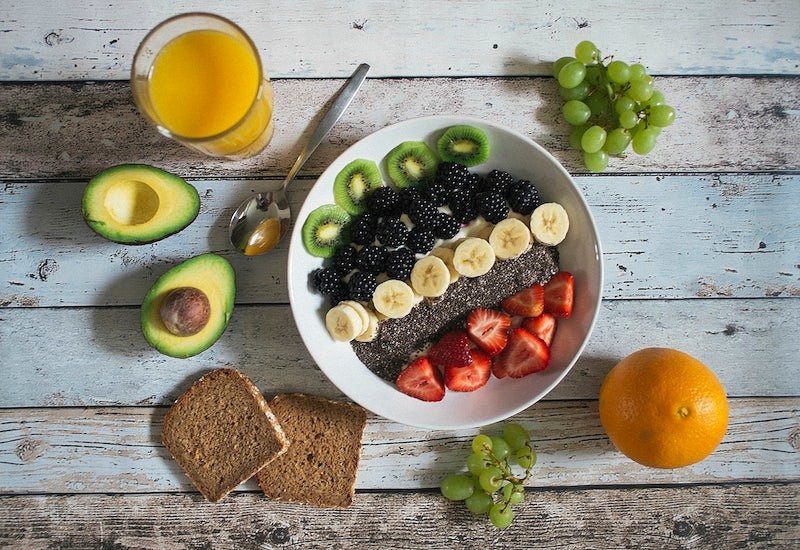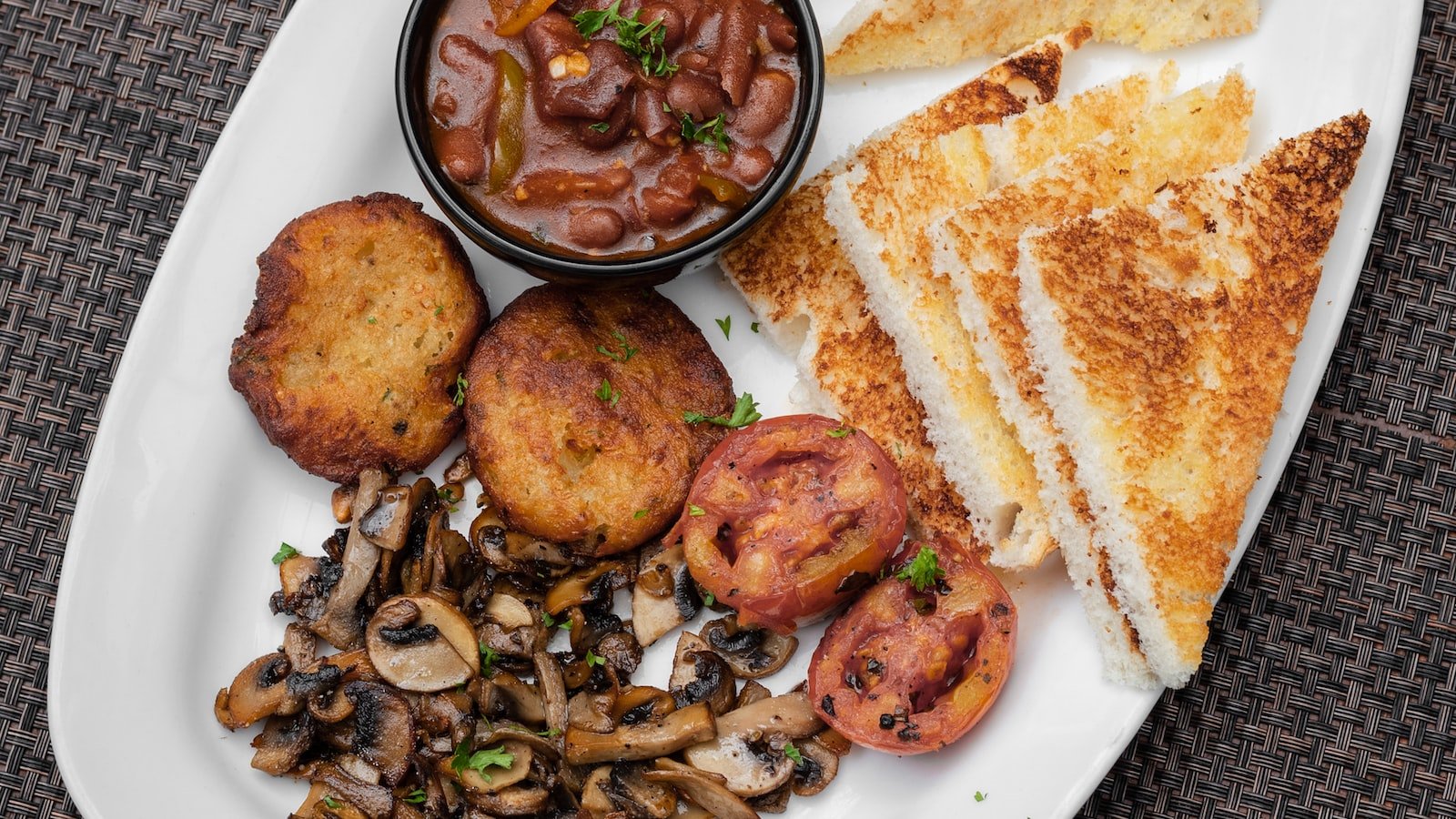Are you tired of counting sheep to fall asleep, only to be woken up by a crying toddler or a midnight feeding session? Well, mamas, listen up! We have the ultimate secret to enjoying a good night’s sleep: your plate. That’s right, what you eat can have a profound impact on the quality of your sleep, and as busy moms, prioritizing self-care through proper nutrition becomes even more crucial. So, say goodbye to restless nights and hello to rejuvenating slumbers, as we present to you “The Mom’s Guide to Eating for Better Sleep.” Get ready to explore a world of delicious and sleep-inducing foods that will leave you feeling refreshed, recharged, and ready to conquer those mommy duties.
Table of Contents
- The Power of Nutrition: How Eating Right Can Improve Your Sleep
- Understanding the Link Between Diet and Sleep Quality
- Essential Nutrients for a Restful Night’s Sleep
- Creating a Sleep-Friendly Meal Plan: Tips and Recipes
- Simple Lifestyle Changes for Mom’s Restful Nights
- Q&A
- Future Outlook

The Power of Nutrition: How Eating Right Can Improve Your Sleep
Nourish your body, enhance your sleep:
Your diet plays a crucial role in achieving a restful night’s sleep. When you are fueling your body with the right nutrients, it can positively impact your sleep quality and duration. Incorporating certain foods into your diet can promote relaxation, reduce nighttime awakenings, and help regulate your sleep-wake cycle.
The power of sleep-friendly nutrients:
1. Magnesium: Found abundantly in leafy greens, nuts, and seeds, magnesium is known for its ability to relax muscles and calm the nervous system. Include these foods in your diet to experience a deeper and more restorative sleep.
2. Trytophan: This essential amino acid is a precursor to serotonin, which in turn is converted into melatonin – the hormone that regulates your sleep cycle. Foods like turkey, bananas, and dairy products are rich in tryptophan and can contribute to a more peaceful night’s sleep.
3. Omega-3 fatty acids: Found in fatty fish, walnuts, and chia seeds, these healthy fats can reduce inflammation and promote better sleep quality. Incorporate omega-3-rich foods into your dinner to help improve your sleep patterns.
Optimal eating habits for sound sleep:
1. Avoid heavy meals before bed: Indulging in large, heavy meals close to bedtime can lead to discomfort and indigestion, making it harder to fall asleep. Opt for a light snack or a smoothie instead.
2. Stay hydrated: Proper hydration can prevent sleep disruptions caused by dry mouth or dehydration. Drink enough water throughout the day, but avoid excessive fluid intake before bed to avoid frequent trips to the bathroom.
3. Limit caffeine and stimulants: Caffeine and other stimulants can interfere with your sleep quality. Avoid consuming these substances in the afternoon and evening to promote a more restful slumber.

Understanding the Link Between Diet and Sleep Quality
Proper nutrition has long been associated with our physical health, but did you know that what you eat can also impact the quality of your sleep? Research has shown a strong link between diet and sleep quality, highlighting the importance of fueling our bodies with the right nutrients for a good night’s rest.
One major factor in this relationship is the consumption of caffeine and its direct effects on our sleep patterns. While a morning cup of coffee might give you the energy boost you need to start your day, consuming caffeine too close to bedtime can disrupt your sleep. Consider limiting your caffeine intake in the afternoon and evening, and opt for herbal teas or decaffeinated options instead.
In addition to caffeine, certain vitamins and minerals play a crucial role in promoting better sleep. Magnesium, for example, has been found to regulate neurotransmitters that are responsible for sleep and relaxation. Foods rich in magnesium include leafy greens, nuts, seeds, and whole grains. Additionally, tryptophan, an amino acid found in protein-rich foods like turkey, chicken, and tofu, can help increase the production of serotonin and melatonin, hormones that promote sleep.
By making mindful choices about what we eat, we can improve our sleep quality and wake up feeling more refreshed and rejuvenated. Prioritizing a balance of nutrients and avoiding sleep-disrupting substances like caffeine before bed can go a long way in achieving a restful night’s sleep.

Essential Nutrients for a Restful Night’s Sleep
Tired of tossing and turning all night? Look no further than incorporating these essential nutrients into your diet to help you achieve a blissful and rejuvenating sleep.
Magnesium:
One of the most critical nutrients for quality sleep is magnesium. It plays a vital role in regulating neurotransmitters responsible for promoting a state of relaxation and calming the nervous system. Foods rich in magnesium include leafy greens like spinach and kale, nuts and seeds, whole grains, and legumes.
Vitamin B6:
Vitamin B6 is essential for the production of serotonin, a neurotransmitter that regulates mood and promotes a sense of calmness. An imbalance in serotonin levels can lead to sleep disturbances. Incorporate foods like bananas, chickpeas, poultry, and fish into your diet to ensure you’re getting enough of this vital nutrient.
Melatonin:
Considered the natural sleep hormone, melatonin helps regulate the body’s sleep-wake cycle. While it can be produced by the body, certain foods can enhance its production. Cherries, walnuts, and oats are excellent sources of melatonin and can aid in promoting a more restful night’s sleep.
By incorporating these essential nutrients into your diet, you’ll not only improve your sleep quality but also ensure that you wake up feeling refreshed and ready to take on the day!

Creating a Sleep-Friendly Meal Plan: Tips and Recipes
When it comes to achieving a good night’s sleep, what you eat can play a significant role in promoting a restful slumber. Here are some tips and delicious recipes to help you create a sleep-friendly meal plan that will leave you feeling refreshed and rejuvenated:
Tips for a Sleep-Friendly Meal Plan:
- Balance Your Macronutrients: Aim to include a combination of lean protein, complex carbohydrates, and healthy fats in each meal. This balanced approach helps regulate blood sugar levels, reducing the likelihood of waking up during the night.
- Avoid Heavy and Spicy Foods: Steer clear of large, heavy meals close to bedtime, as they can lead to discomfort and indigestion. Additionally, spicy foods can cause heartburn and increase the chances of sleep disruptions.
- Choose Sleep-Enhancing Ingredients: Incorporate foods rich in sleep-promoting nutrients, such as tryptophan, magnesium, potassium, and B vitamins. These include salmon, banana, spinach, almonds, and whole grains.
- Limit Caffeine and Alcohol Intake: Both caffeine and alcohol can interfere with your sleep quality. Reduce or eliminate caffeine consumption in the afternoon and evening, and avoid alcohol close to bedtime.
Sleep-Friendly Recipes:
- Creamy Spinach and Salmon Quinoa Bowl: This nutrient-packed bowl combines protein-rich salmon, leafy greens, and whole-grain quinoa for a satisfying and sleep-inducing meal.
- Banana Almond Overnight Oats: Prepare this delicious make-ahead breakfast the night before for a hassle-free morning. Oats, almond milk, and banana provide a winning combination of fiber, magnesium, and potassium that promotes a restful sleep.
- Turkey and Veggie Stir-Fry: Swap out the heavy, late-night takeout with this lighter alternative. Lean turkey, colorful veggies, and a sprinkle of sesame seeds make this dish a balanced and soothing option for dinner.
Remember, creating a sleep-friendly meal plan is only one piece of the puzzle for achieving better sleep. Other essential factors include maintaining a consistent sleep schedule, practicing relaxation techniques, and creating a comfortable sleep environment. Sweet dreams!
Simple Lifestyle Changes for Mom’s Restful Nights
Moms often find it challenging to get a good night’s sleep with their never-ending to-do lists and endless responsibilities. However, incorporating a few simple lifestyle changes can help moms achieve a much-needed restful night’s sleep and rejuvenate their energy levels.
Establish a bedtime routine: Creating a consistent bedtime routine can signal your body that it’s time to unwind and prepare for sleep. Consider activities such as taking a warm bath, reading a book, or practicing relaxation techniques like meditation or deep breathing.
Limit caffeine and electronic devices: It’s no secret that caffeine can interfere with sleep, so consider reducing your intake, especially in the evenings. Additionally, the blue light emitted by electronic devices disrupts the body’s natural sleep-wake cycle. Avoid screen time at least an hour before bed to promote better sleep quality.
Create a cozy sleep environment: Make your bedroom a sleep-friendly haven by keeping it cool, dark, and quiet. Invest in comfortable bedding and ensure your mattress and pillows provide adequate support. Consider using blackout curtains, earplugs, or a white noise machine to drown out any disruptive noises.
Practice stress management: As a mom, finding ways to manage stress is essential for better sleep. Engage in activities that help you unwind, such as gentle exercise, journaling, or listening to calming music. Prioritize self-care and delegate tasks whenever possible, giving yourself the much-needed relaxation time you deserve.
By implementing these simple lifestyle changes, moms can improve the quality of their sleep and wake up feeling more refreshed and ready to conquer the day.
Q&A
Why is sleep important for moms?
Sleep is crucial for moms as it helps restore and rejuvenate the body, boosts mood and mental health, and improves cognitive function. A good night’s sleep is essential for moms to have the energy and patience needed to tackle daily tasks and care for their families.
How can a mom’s diet affect her sleep?
A mom’s diet plays a significant role in sleep quality. Avoiding heavy meals close to bedtime, reducing caffeine and alcohol intake, and opting for sleep-promoting foods like whole grains, fruits, and vegetables can help improve sleep. Balanced nutrition can promote relaxation and create a conducive environment for quality rest.
Are there specific foods that can help moms sleep better?
Certain foods are known to aid sleep. For instance, foods rich in tryptophan, like turkey, salmon, and nuts, can promote the production of sleep-regulating hormones. Additionally, foods containing melatonin, such as cherries and kiwis, can also help regulate sleep-wake cycles and improve overall sleep quality.
What foods should moms avoid to ensure better sleep?
Avoiding foods high in sugar and refined carbohydrates close to bedtime can prevent spikes in blood sugar levels that disrupt sleep. Additionally, it’s wise to limit consumption of caffeine, as it can interfere with falling asleep and staying asleep. Lastly, greasy or spicy meals can cause indigestion, making it harder to sleep comfortably.
What are some other lifestyle changes moms can make to improve sleep?
Alongside dietary changes, establishing a consistent sleep schedule, creating a relaxing bedtime routine, and ensuring a calm sleep environment can greatly enhance sleep quality for moms. Other helpful practices include regular exercise, limiting screen time before bed, and managing stress levels through activities like meditation or journaling.
Can breastfeeding affect a mom’s sleep patterns?
Breastfeeding can influence a mom’s sleep in the early stages. It’s important to establish a feeding routine and take advantage of daytime naps when possible. Having a supportive partner or family member assist with nighttime feedings can also help moms get the necessary sleep they need to function well.
How long before bed should a mom eat dinner?
Ideally, moms should eat dinner at least two to three hours before bedtime to allow for proper digestion. Eating too close to bedtime may cause discomfort, and going to bed on an empty stomach can also disrupt sleep. Finding the right balance and timing for meals can vary for each individual, so it’s essential to listen to your body’s needs.
Can dietary supplements aid in better sleep for moms?
Certain dietary supplements, like magnesium and lavender extract, have been shown to have sleep-promoting properties. However, it’s important to consult with a healthcare professional before starting any new supplements to ensure they are appropriate for your individual needs and won’t interact with any medications you may be taking.
What if a mom is still struggling with sleep despite following these tips?
If sleep issues persist, it’s advisable for moms to consult a healthcare professional. They can assess any underlying sleep disorders or conditions that may be contributing to the problem. Individualized solutions, such as therapy, medication, or further lifestyle adjustments, can be recommended to help moms achieve better sleep and overall well-being.
Future Outlook
As we bid you goodnight, dear moms, on this journey toward better sleep, let us remember the power that lies within our plates. From the depths of our kitchens, a multitude of flavors and nutrients await us, ready to fuel a rejuvenating slumber like never before. So, as we turn off the lights and lay our heads to rest, may we find solace in the knowledge that our meals hold the key to sweet dreams and well-deserved rest. Enriching our diets means elevating our sleep, and in turn, enhancing our ability to conquer the challenges that lie ahead. Embrace the potential that lies within your pantry, and fuel both body and mind, for a sleep that restores your spirit and propels you to be the best mom you can be. Because remember, dear mom, a well-rested soul holds the power to illuminate the world. Sleep tight, dream big, and wake up ready to conquer the day.
As an affiliate, my content may feature links to products I personally use and recommend. By taking action, like subscribing or making a purchase, you’ll be supporting my work and fueling my taco cravings at the same time. Win-win, right?
Want to read more? Check out our Affiliate Disclosure page.